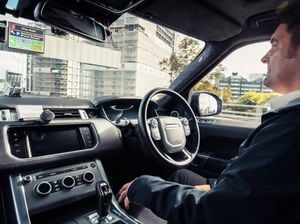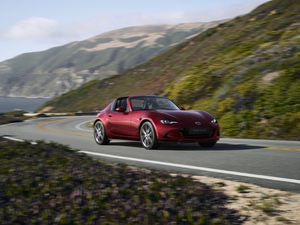Look, no hands! Self-driving Range Rover Sport tackles rush-hour ring road
Meet the hands-free car that has just tackled one of the West Midlands' most challenging road networks – without its human 'driver' lifting a finger.

Packed full of the latest hi-tech sensors and equipment, this self-driving Range Rover Sport handled complicated lane changes, slip roads, traffic lights and roundabouts all at the speed limit of 40 mph, even in rush hour, as it negotiated Coventry Ring Road for the first time.
The test was part of the £20 million Government-funded UK Autodrive project that is due to end this month, after three years' work.
West Midlands-based luxury car maker Jaguar Land Rover – which builds its engines near the Shropshire border alongside the M54 – has been one of the lead companies in the project and plans to make self-driving vehicles a reality for its customers within the next decade.
Safety surrounding the project has been crucial, and JLR's engineers carried out extensive testing on the self-driving technology on closed tracks before heading onto public roads in Milton Keynes and Coventry.
Mark Cund, Jaguar Land Rover's autonomous vehicle research manager, said: “The Coventry Ring Road is known for its complicated slip roads and exits. It makes for very challenging conditions, especially when under pressure in the rush hour.
“Our self-driving car is not impacted by the same pressure, frustrations or fatigue that a driver may experience and so it’s capable of turning a potentially very stressful situation into a completely stress-free one.”
The Range Rover Sport chosen for its performance and existing features, such as Adaptive Cruise Control, has been modified to include additional navigation sensors, radar and Lidar. Coupled with the UK Autodrive research, the vehicle can now autonomously handle roundabouts, traffic lights, pedestrians, cyclists and other vehicles on complicated roads. It can even park itself.
The technology uses the internet to connect vehicles to each other and to infrastructure such as traffic lights. One of the major developments during the project has been installing 'smart' technology into the road network that can then communicate with the self-driving cars.
Coventry has been chosen for much of the testing because it is so close to Jaguar Land Rover's headquarters and technology research centres, at Whitley. The company is continuing its work to make its self-driving vehicles capable of working in the widest range of terrain and weather conditions.
The company has also been putting effort into ways of making pedestrians feel safer around self-driving cars.
In August JLR unveiled an autonomous pod with big googly-eyes designed to 'look' directly at pedestrians at road crossings so they could be confident that the machine knows they are there and won't run them over.





